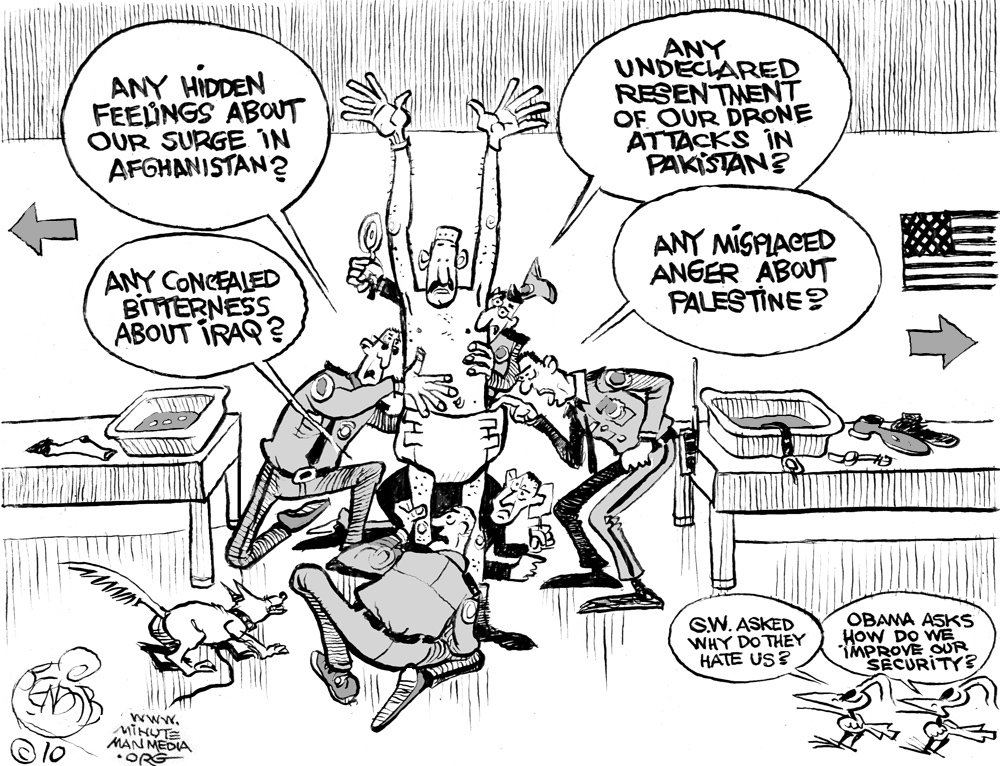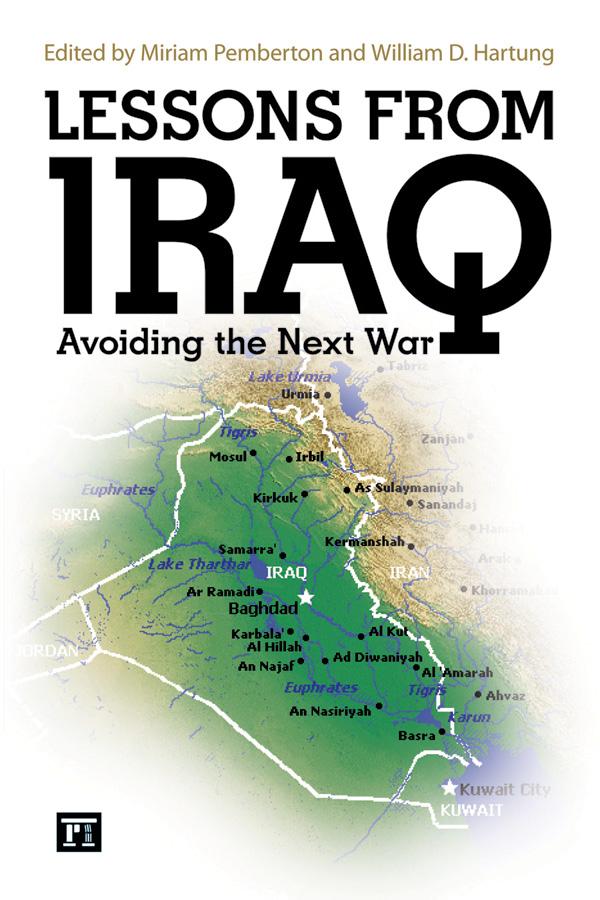
Tortured Evidence
He also pleads guilty for Hurricane Katrina, Haiti’s earthquake, and Mt. Pinatubo’s eruption.

He also pleads guilty for Hurricane Katrina, Haiti’s earthquake, and Mt. Pinatubo’s eruption.
Former MI6 officials condemn U.S. use of torture.

During the Bush years, the CIA lost its sense of smell. On the torture issue, its lawyers no longer could tell what was fishy and what was not.
Torture is a profound abuse of the rule of law. A lack of full accountability for those responsible for U.S. torture policies has far-reaching and unexpected implications. A just rule of law cannot be established without full accountability for torture of U.S. detainees. If we allow those who committed and authorized torture, whether interrogators or senior executive officials, to go uninvestigated and unpunished we risk destabilizing the international legal regime and delegitimize our domestic criminal justice system. True accountability for torture is not only a moral imperative, but because of international obligations such as the Convention Against Torture, a legal obligation.

The Obama administration promised to close the infamous detention center but delivered more of the same.
On the issue of torture, what goes around comes around.

Artist Daniel Heyman, Professor Julie Mertus, and attorney Katherine Gallagher will explore the issues of artistic and legal representations of victims of torture in a panel discussion moderated by Sarah Anderson. This event is sponsored by Foreign Policy In Focus and Provisions Library and is connected to an exhibit called "Close Encounters: Facing the Future," also at the Katzen Center, which runs through October 26.
Daniel Heyman is a painter and printmaker from Philadelphia who has been capturing the images and words of Iraqi victims of torture from U.S. facilities like Abu Ghraib. In these works, now on display in “Close Encounters,” Heyman’s spare and expressive portraits are haloed by words from the victims’ own harrowing narratives. More of his work may be viewed at his website [http://www.danielheyman.com/].
Julie Mertus is an Associate Professor and Co-Director of the MA program in Ethics, Peace and Global Affairs at American University. Her work focuses on human rights, U.S. foreign policy, refugee and humanitarian law and policy, gender and conflict, and post-war transitions, with a specialty on the former Yugoslavia. Professor Mertus has nearly twenty years experience in the human rights field, as a field researcher, lawyer, advocate, political analyst and trainer.
Katherine Gallagher is a Staff Attorney at the Center for Constitutional Rights (CCR), where she focuses on holding individuals, including US and foreign government officials, and corporations, including private military contractors, accountable for serious human rights violations. Prior to joining CCR, she worked at the United Nations International Criminal Tribunal for the former Yugoslavia from 2001-2006.
Moderator and IPS Global Economy Project Director Sarah Anderson has written numerous studies, articles and books on global corporations and the social and environmental impacts of trade and investment liberalization.
This event is free and open to the public.
The Katzen Arts Center is located on Ward Circle at the intersection of Massachusetts and Nebraska Avenues in NW Washington, D.C. For museum hours and driving directions, please visit their website.
The "Close Encounters" exhibit is part of BrushFire, a national arts initiative organized by Provisions Library and focusing on social activist art in the run-up to the November elections.

The Foreign Policy In Focus Annual Summer Film Series gets underway with the Academy-Award-winning Taxi to the Dark Side. Please join us and our two guest speakers, Farrah Hassen, Newman Fellow at the Institute for Policy Studies, and Andy Shallal of Iraqi Voices for Peace and the owner of Busboys and Poets.
Alex Gibney’s Taxi to the Dark Side is a perpetually shocking documentary about the Bush administration’s use of torture when dealing with political prisoners, with a particular focus on those captured in Iraq and Afghanistan. The title of Gibney’s movie is derived from the treatment meted out to an Afghani taxi driver named Dilawar, who was mistakenly fingered as a terrorist, then killed during a torture session conducted by American troops. Despite the title, Dilawar’s case is just a small part in Gibney’s jigsaw, as the director uses excruciating and comprehensive details surrounding the taxi driver’s death as a starting point in his search for the people who have permitted such incidents to occur. Gut-wrenching and fully uncensored pictures from Abu-Ghraib feature alongside interviews with military personnel (some of whom tortured Dilawar) as Gibney’s search slowly heads into the upper echelons of the military and, ultimately, into the Bush regime itself. Taxi to the Dark Side is a powerful, well-executed piece of filmmaking. Gibney’s skills as a director come to the fore as he manages to pull some surprisingly candid revelations from his subjects, while his choice of newsreel clips featuring the likes of Dick Cheney and Donald Rumsfeld are extremely well chosen. Perhaps the most eye-opening scenes come from a press trip to the U.S. facility at Guantanamo Bay, where Gibney and others are given a tour of the facilities, including the site gift shop, where gallows humor is stretched to breaking point with the sale of souvenir t-shirts bearing the legend Behavior Modification Instructor. The film concludes with Gibney pulling the focus back to Dilawar once again, highlighting the futility of his death as a number of commentators show how torture isn’t, and never has been, an effective method for extracting information from people.
The FPIF film series is co-sponsored by Busboys and Poets Restaurant and the Progressive Intern Network.
Calendar of Films:
Taxi to the Dark Side
Best Documentary – Academy Award
Thursday, July 3
5:30-7:30pm
Speakers: Farrah Hassen, Newman Fellow, Institute for Policy Studies
and Andy Shallal, Iraqi Voices for Peace and Owner of Busboys and Poets
Camden 28
Best Documentary – Philadelphia Film Festival
Friday, July 11
5:30-7:30pm
Speaker: Marcus Raskin, Co-Founder and Distinguished Fellow, Institute for Policy Studies
Cocalero
Nominated, Grand Jury Prize for Best Documentary – Sundance
Friday, July 18
6:00- 8:00pm
Speaker: Sanho Tree, Fellow and Director of Drug Policy Project, Institute for Policy Studies
Body Of War
Best Documentary – Hampton International Film Festival and Best Documentary – National Board of Review
Friday, July 25
5:30-7:30pm
Speaker: Geoff Millard, Iraq Veterans Against the War
Maquilápolis
Outstanding Achievement in Documentary – Tribeca Film Festival and Audience Award for Best Documentary – Barcelona International Women’s Film Festival
Thursday, July 31
5:30-7:30pm
Speakers: Sarah Anderson, Fellow and Director of the Global Economy Project at the Institute for Policy Studies and Manuel Perez Rocha, Associate Fellow, Institute for Policy Studies
Foreign Policy In Focus is a network for research, analysis and action that brings together more than 600 scholars, advocates and activists who strive to make the United States a more responsible global partner. It is a project of the Institute for Policy Studies (IPS) in Washington.
For more than four decades, the Institute for Policy Studies has transformed ideas into action for peace, justice, and the environment. It is a progressive multi-issue think tank.
The Iraq War may have an upside, of sorts. It should allow us to take quite a few discredited policies permanently off our table of options. Preventive war. Politicized intelligence. Coalitions of the coerced. New frontiers of media manipulation. To name a few.
In a new book, Lessons From Iraq: Avoiding the Next War, Institute for Policy Studies Research Fellow Miriam Pemberton and New America Foundation Fellow William D. Hartung have asked the experts to boil the lessons of the war down for the rest of us. The authors include The Three Trillion Dollar War co-authors Joseph Stiglitz and Linda Bilmes, Aziz Huq, Jeffrey Laurenti, pre-war UN weapons inspector Hans Blix, and National Book Award winner Frances Fitzgerald.
As Barbara Ehrenreich put it: "Read this compelling set of essays and join the movement to prevent the next war."
Hartung, Fitzgerald, Huq, and Laurenti will lead the discussion of these lessons, and how to make sure they are permanently learned.
A reception will follow the discussion.

If the Iraq War disaster has an upside, it’s this: the conflict should permanently discredit many awful policies and practices, allowing the nation to declare them off-limits for the future. Preventive war. Politicized intelligence. Coalitions of the coerced. New frontiers of media manipulation.
That’s what Lessons From Iraq: Avoiding the Next War is about. This remarkable new book, co-edited by IPS research fellow Miriam Pemberton, who is also the Foreign Policy In Focus peace and security editor, and William Hartung, Director of the Arms and Security Initiative at the New America Foundation, is now available online and at bookstores. Please read the introduction, by Miriam Pemberton, on our site.
Pemberton and Hartung drew up a list of what lessons the United States should learn from the Iraq War and asked the experts on each to boil down what they know for the rest of us. The authors include Ivan Eland, The Three Trillion Dollar War co-authors Joseph Stiglitz and Linda Bilmes; pre-war UN weapons inspector Hans Blix, and Pultizer Prize and National Book Award winner Frances Fitzgerald.
As Barbara Ehrenreich put it: "Read this compelling set of essays and join the movement to prevent the next war."
Senators Clinton, McCain, Obama have something to say about the UN, nuclear proliferation and other global cooperation issues. Really.
Many of the most resonant images from the Iraq War are as deceptive as the Bush administration’s rationales for starting the war in the first place.
The case for shutting down not just the prison, but the military base where it sits.

Activist Bryan Farrell expected be put in jail for standing up for the rights of prisoners at Guantanamo. What he didn’t expect was 30 hours of imprisonment, the realization that this was nothing compared to those in Guantanamo, and the sense of solidarity with the 82 other activists who decided to stand up for human rights.
The heart of the municipal foreign policy movement remains the opposition to the Iraq War.